South Korea's K-Pop stars look for success in Australia
- Published
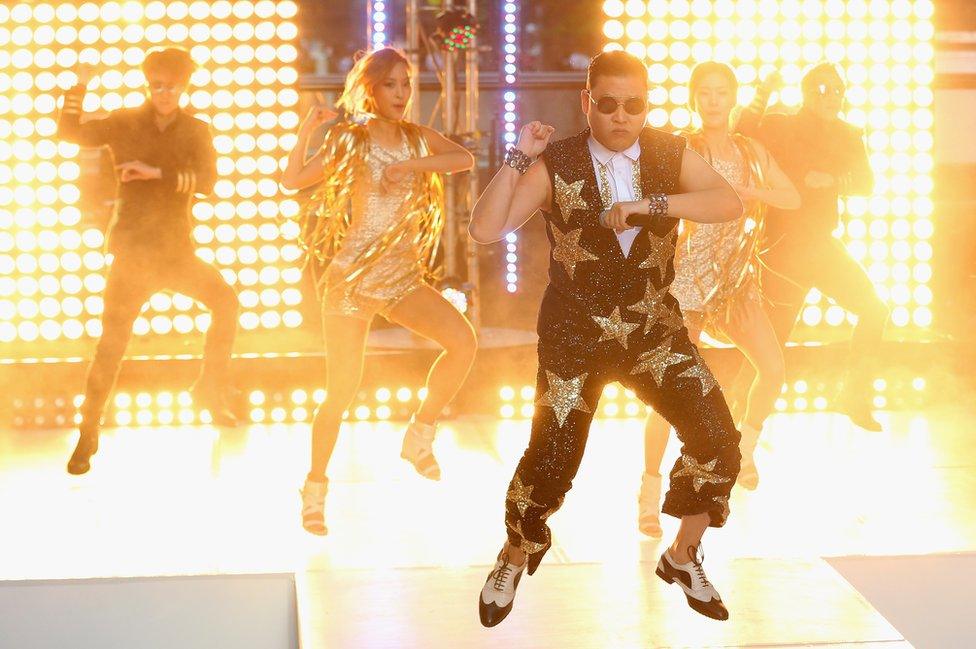
Psy - the South Korean rapper responsible for Gangnam Style - during a 2012 performance in Sydney
In music video Insomnia - the catchy hit by South Korean band JJCC - a boy dressed in a skinny black suit walks along a sandy path hand in hand with a girl. Although the sun is shining and the sky is blue, both sport umbrellas: one yellow, one orange.
Those umbrellas made an appearance in Sydney earlier this year, when the seven-strong boy band played their debut Australian performance at arts hub Carriageworks alongside the more established Boyfriend for the Chinese New Year.
In candy-hued choreography - wearing low-slung nineties-style cargo pants and baggy T-shirts, matched by bouncy coiffed hair - JJCC twirled their umbrellas in unison, creating the on-stage equivalent of a hyperactive rainbow.
That in South Korea umbrellas are used not only to keep away the rain, but also as a shield from the rays of the sun is only one cultural difference that has made the Western market difficult to crack for Asian stars.
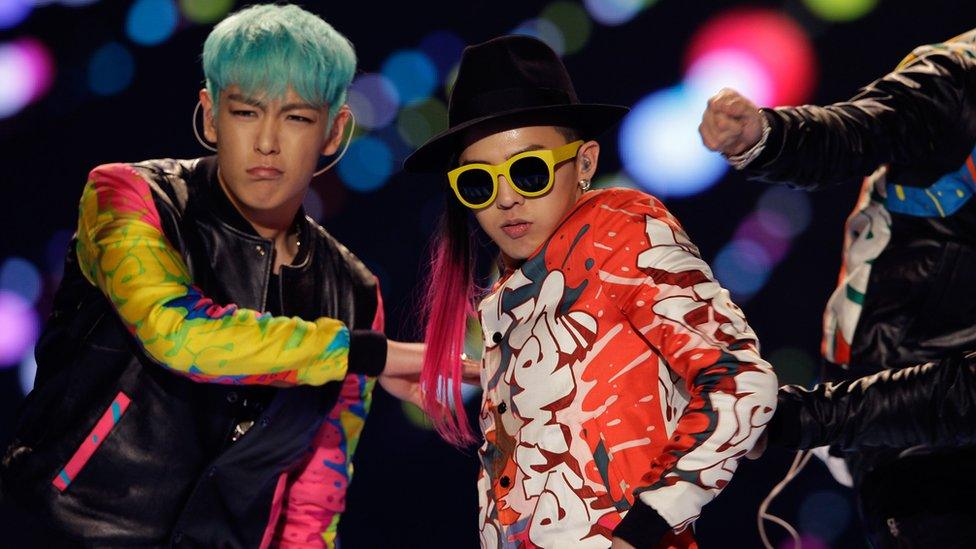
K-pop band Big Bang have played a series of sold-out concerts in Australia
Culture club
Australia is economically tied to Asia and 6% of Australians (some 1. 22 million people) were born in Asia, according to the 2011 census. Culturally, however, Australia continues to look to Western Europe and America.
"Western culture is dominant," states Johnny Au, Sydney-based editor-in-chief of website Hello Asia!
America's status as a superpower, in particular, means "they project their culture across the world".
This trickles down to pop: songs recycled across mainstream radio are overwhelmingly British, American or Australian.
Sharing a common language is crucial. "It is quite hard not just for Asian but for any foreign music to make an impact on the charts," explains Au. "One of the last times was Macarena, after that it was Psy's Gangnam Style. It's a 10-year cycle."
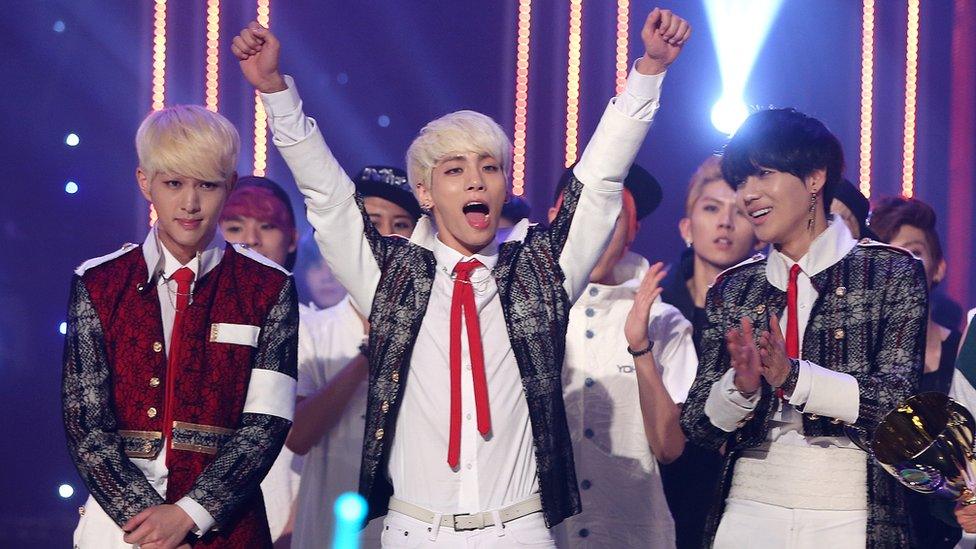
South Korean idol pop outfit 'SHINee' performing at MBC music show in Seoul
Top of the K-pop
Conceived in South Korea in the 1990s as a Western-Asian hybrid, K-pop is now a multi-million dollar industry. Tens of dozens of highly manufactured boy and girl bands "debut" each year, most consigned to burn brightly for a few songs before fizzling into obscurity.
Today K-pop is a driving force in the South Korean wave known as hallyu that has inundated Asia since the turn of this century. Korean soap operas, pop, and even film now challenge Hong Kong and Japan for their cultural domination and reach.
But if hallyu is seemingly unstoppable in Asia, it has yet to make a significant mark in the West, which has largely eluded K-pop's tentacles. Only Psy's Gangnam Style has found mass chart success.
The satirical tune, sung by a K-pop industry outsider who lampoons its tropes, became the first ever video online to reach one billion views when released in 2012. Today the number is over to 2.5 billion.
Gangnam Style "is actually not the K-pop that we know and love," notes Jamaica dela Cruz, co-host of Australia's SBS PopAsia.
"Western pop audiences, especially celebrities who tweeted Gangnam Style, just thought it was really funny - and that's not K-pop's intent. They want to be beautiful. But it pushed the K-pop that we do know into the limelight. It gave a window into Asian pop."
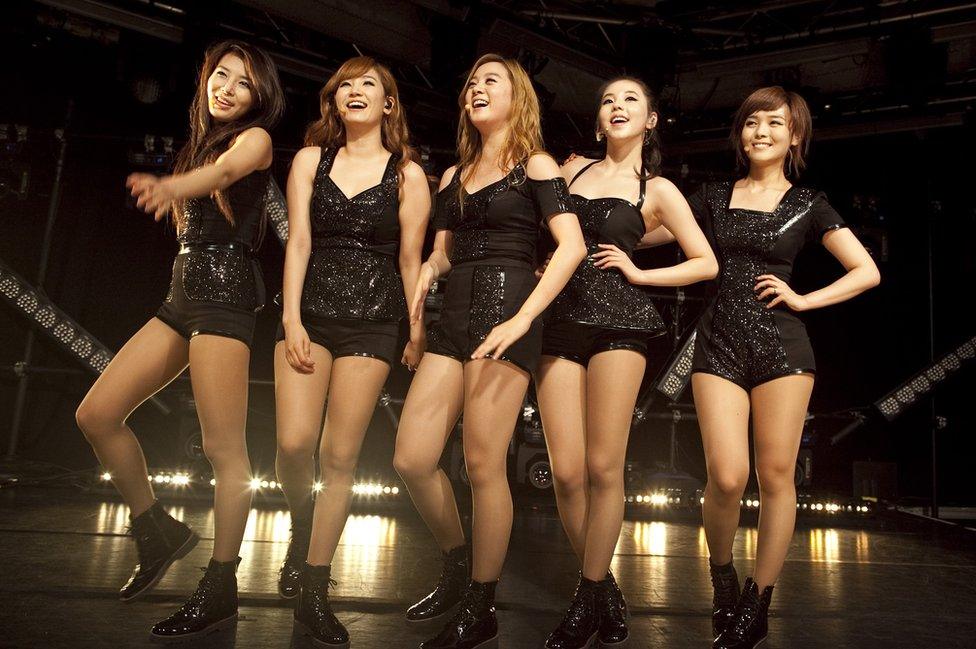
The K-Pop group Wonder Girls failed to penetrate the American market
Hit factory
Still, Gangnam Style remains an anomaly. Despite spending two years in New York, for example, wildly popular K-pop band Wonder Girls failed to penetrate the American market.
Yawning cultural differences play their part, with virtues prized in South Korea considered off-putting in the West.
K-pop "idols" are micro-managed by record companies in South Korea, working punishing hours under so-called "slave contracts" that control everything from clothes to diet.
Administering a "fan service" via social media and preserving a clean-cut image in an industry often labelled "bubblegum pop" is considered key to popularity; dabbling in drugs, drink or dating can end a career.
By contrast boy-bands who make it big in the West, such as One Direction, peddle individuality and rock star behaviour, even if they too are carefully managed.
"I'm going to go out on a limb and say that there is no way that a K-pop boy group will make it big in the States," journalist John Seabrook declared in The New Yorker in 2012 in his article Factory Girls, external.
"Perhaps there is an audience of 10 to 12-year-old girls who could relate to these guys, but there's a yawning cultural divide between One Direction, say, and SHINee."
K-pop's inability to break the West is not for want of trying. JJCC, founded in 2014 by martial arts star Jackie Chan, features both Korean-American and Chinese-Australian band members, a "very deliberate strategy to engage with fans in different areas," insists Au.
"Our group was treated from the start to become global," confirms American-born JJCC member Eddy Oh. "We really want to have an impact like the Backstreet Boys."
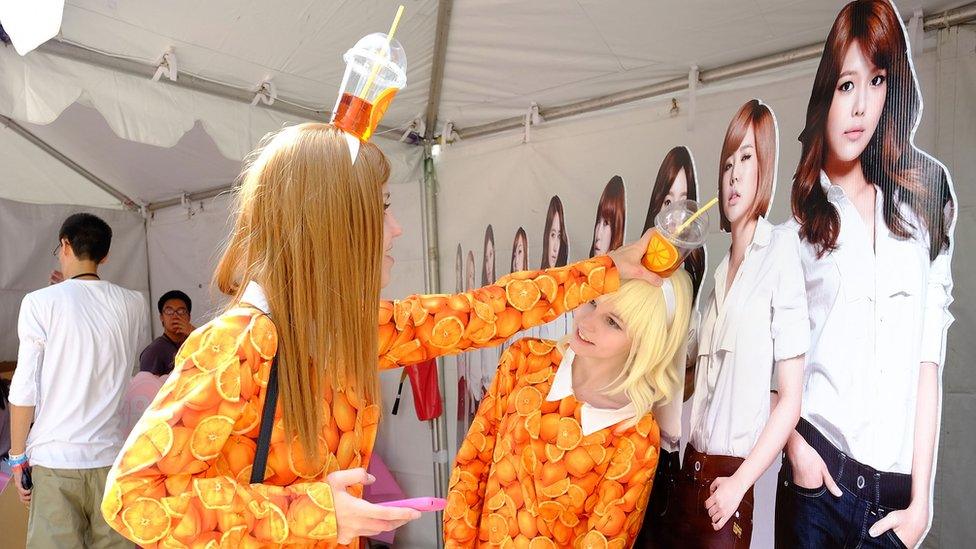
A couple of revellers at the 2014 KCON festival in Los Angeles
Hallyu hallelujah
A niche foreign market does, of course, exist. KCON, America's largest Hallyu Festival held in Los Angeles and New York, catered to 75,000 people in 2015. Last year, Big Bang, one of K-pop's most successful bands, had sell-out concerts in Australia.
Fan Emily Nunell, 19, who was introduced to K-pop by a Japanese friend in school, says she is attracted to the music because it is "something different".
"It's an indie thing," agrees Au. "There's a cool factor and a community factor."
Back at the JJCC gig, pop concert is merged with a live game show. JJCC do an on-stage Q&A, down a meat pie, and play charades with fans - acting out a crocodile, koala, and hopping kangaroo.
And in a sign, perhaps, that even for ardent Aussie K-pop fans an entire set of Korean rap might be too much, the band performed as many Western covers as homegrown tracks.